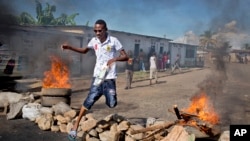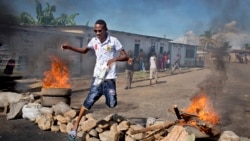Gunfire is rocking Burundi’s capital Bujumbura as rival factions of the Central African nation's security forces confront each other following the May 13 announcement by Major General Niyombare that he had taken control of the government. The announcement occurred while President Nkurunziza was in Tanzania for a Summit of the East African Community, where leaders were addressing the crisis that has beset Burundi since the April 25 announcement by the ruling party of the candidacy of President Nkurunziza for a third term, despite the provisions in the 2000 Arusha Peace Agreement limiting presidents to two terms.
The announcement triggered street protests, mainly in the capital Bujumbura, that the police tried to repress with water cannons, tear gas, and live ammunition. An estimated 20 people were killed, hundreds injured, and hundreds detained during the two weeks of protests. Intimidation and violence by the ruling party’s youth militia in advance of the planned May 26 legislative and June 26 president elections have been cited by some of the over 60,000 Burundian refugees as the reason for seeking safety in neighboring countries since the end of March.
The United States has been following the situation closely and deplores the violence now gripping Bujumbura. In nominating the president for a third term, Burundi's ruling party missed an historic opportunity to advance democracy.
The United States calls on all parties to immediately end the violence and exercise restraint.We support the East African Community leaders’ call on May 13 for peaceful, democratic elections in line with Burundi’s electoral laws and the spirit of the Arusha Agreement that ended the nation's devastating civil war.
We urge all stakeholders to take the steps necessary to create the conditions required for peaceful, timely, credible and transparent elections, and to respect the rule of law, including those provisions of Burundian law regarding civilian rule. We are deeply concerned about reports of Burundian military involvement in the violent events in Bujumbura. Under the Leahy Law, the United States cannot provide U.S. military assistance or training to Burundian military units that have committed gross violations of human rights. It is essential for all Burundians – both military and civilian – to uphold the spirit of the Arusha Agreement and reject violence.The United States will continue to monitor the situation in Burundi closely, and will, as appropriate, refuse U.S. visas to those who participate in, plan, or order violence against the civilian population.






